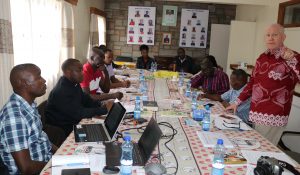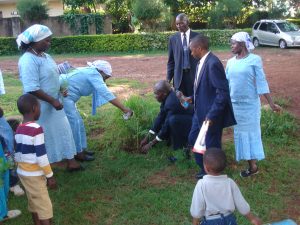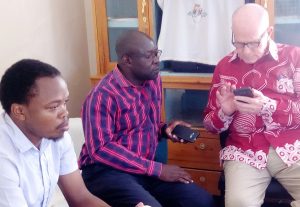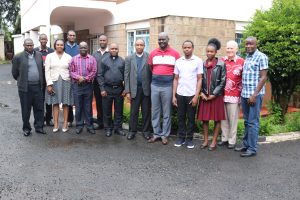Small Christian Communities as Promoters of Social Justice
By Joseph G. Healey, MM

Mwanajumuiya Padre Joseph Healey, MM emphasizes the “Centrality of the Bible in Small Christian Communities (SCCs)” during a workshop of the AMECEA Small Christian Communities (SCCs) Training Team in Nairobi, Kenya.
A Catholic lay woman in a Small Christian Community (referred to as SCC) in Our Lady of Guadalupe Parish in Nairobi Archdiocese, Kenya said: “In our traditional African family and society we women are second class. This is reinforced by patriarchal African customs. In our hierarchical, clerical Catholic Church we women feel at the bottom. But in our weekly SCCs as we sit around in a circle and read and reflect on the Gospel of the following Sunday, we feel that we women are equals and have a voice.”
This story illustrates how the SCC Model of Church is bringing about change and transformation towards equality and social justice.
A New Way of Thinking About and Living Justice and Peace
In addition to our traditional ways of thinking about justice, we have a new vocabulary connected to integral ecology (especially the vision of Pope Francis in Laudato Si’) and the environment: “climate justice.” Climate justice is a term used for framing global warming as an ethical and political issue, rather than one that is purely environmental or physical in

Lay members of St. Kizito Small Christian Community (SCC) water a seedling in the Waruku section of Nairobi, Kenya in East Africa during a Tree Planting Activity as part of the annual Kenyan Lenten Campaign.
nature. Throughout Africa Young People Small Christian Communities (YPSCCs) are advocating for climate justice through small faith-sharing communities, protest marches and the social media.
In addition to our traditional ways of thinking about peace, we can think outside the box. Many people were surprised when Wangari Maathai won the 2004 Nobel Peace Prize. They asked, “what does this have to do with peace?” Maathai, a renowned Kenyan social, environmental and political activist and the founder of the Green Belt Movement, promoted planting of millions of trees to help bring peace and security.
St. Kizito SCC is located in Waruku, an informal settlement area in St. Austin’s Parish in Nairobi Archdiocese. SCC members are concerned about their environment. Tree planting and collecting garbage and trash have been part of their action projects during the annual Kenyan Lenten Campaigns.
Case Studies on “How SCCs Promote Reconciliation, Justice and Peace in Eastern Africa”
The free, online Ebook Building the Church as Family of God: Evaluation of Small Christian Communities in Eastern Africa (https://smallchristiancommunities.org/building-the-church-as-family-of-god-evaluation-of-small-christian-communities-in-eastern-africa-2) has a full chapter on “How SCCs Promote Reconciliation, Justice and Peace in Eastern Africa.” Here are some Case Studies and examples:
- SCC members use African proverbs and sayings to promote justice and peace on the grassroots level. In challenging the dictatorship and one person rule in Malawi, the people used the Chewa (Malawi) and Nyanja (Zambia) proverb One head does not hold up (or carry) a roof. Another example is the Chewa (Malawi) and Nyanja (Zambia) proverb One white ant does not build an ant hill. Conversely proverbs using the pattern “Two…” communicate unity, cooperation, strength and success. Example: Bangles sound when there are two (Sena, Zambia). Another common pattern to communicate unity, cooperation, strength and success are the African proverbs that begin “Many…” Example: Many sticks burn together (Swahili, Eastern and Central Africa).
To encourage the SCCs values of unity, teamwork and cooperation there is the famous Amharic (Ethiopia) proverb When spiders unite, they can tie up a lion. Another version is Enough spider webs wound together can stop a lion. The Amara Ethnic Group in Addis Ababa and other parts of Ethiopia use this proverb in many different situations to emphasize the value, importance, power and strength of unity. Individually a person is weak, but working together people are very strong. For example, if ordinary people work together they can overcome an unpopular leader like a dictator.
- When Kenya plunged into a wave of riots and violence in January, 2008 much of the unrest was fueled by tribalism and negative ethnicity. This dramatically affected the thousands of SCCs too. But some communities and people rose above the crisis. Some SCCs in Kenya became effective local tribunals to mediate tribal and ethnic conflicts. A three member mediation team was formed in St. Joseph the Worker Parish, Kangemi in Nairobi Archdiocese. First, a member of St. Augustine SCC visited all 28 SCCs in the parish during a three month period to learn where the conflicts existed. The team itself came from three different SCCs and was a mixed group consisting of two men and one woman – one Kamba, one Kikuyu and one Luyia. They visited the specific SCCs that had the conflicts to promote the healing of their ethnic tensions and promote reconciliation and peace. The team especially encouraged the SCC members to talk about their problems and feelings. Later members of five SCCs participated in a mass in the parish hall to offer thanksgiving for the reconciliation and peace that had taken place. Up until today peace and harmony continue among the SCC members.
- In 2008 Kenyan layman and evangelist Simon Rurinjah, a member of our AMECEA SCCs Training Team, was invited to the new Parish of Tegat (that had been divided from Longisa Parish) in Kericho Diocese, Kenya by Father Daniel, the Parish Priest, to be a mediator in a dispute between the Kalenjin and Kikuyu Ethnic Groups. This dispute involved the Kalenjin people burning the houses and stealing the cattle of the Kikuyu people during the January-February, 2008 post-election crisis in Kenya. The Kikuyu fled from the area and then later came back to their homesteads.
In April, 2008 with the elders (both men and women) present, there was a week of mediation on the parish and outstation levels of the families of the two ethnic groups concerned that had intermarried over the years. On the last day seven SCCs gathered to participate in a forgiveness and reconciliation ceremony. Prayers were said by each ethnic group. As part of the compensation and restorative justice, the Kalenjins rebuilt the houses and returned the cattle of the Kikuyu as a fine for their original wrongdoing.
Then nine months later in 2009 there was a special Reconciliation Mass with prayers in both the Kalenjin and Gikuyu languages. Everyone in the SCCs participated in a communal meal of reconciliation with both Kalenjin and Kikuyu food served and eaten by the whole community. Everyone agreed that this violence and wrongdoing should never happen again. Until today (December, 2019) the peace continues and the local people are forgetting the past disputes.
SCCs Fight Corruption Through the Social Media
The Small Christian Community Facebook Page (https://www.facebook.com/www.smallchristiancommunities.org) posed this question: People are asking how Small Christian Communities (SCCs) can actively participate in the current anti-corruption campaign in Kenya? Please give you answers here especially practical, on the grassroots, examples. Some online responses:
-

Mwanajumuiya Padre Joseph Healey, MM shows Wanajumuiya Cosmas Kinda and Collins Ongoma how to access the Small Christian Communities (SCCs) Website and the SCCs Facebook Page on the Smartphone.
People giving money (bribes) while seeking for employment or seeking government documents such as Birth Certificates, Driving Licenses or passports. We Catholics should refuse to participate.
- Many people have had the experience of being asked for a bribe by the traffic police. We Catholics and members of SCCs should say “no.” Otherwise this style of corruption becomes a way of life.
- The online Kenya Maryknoll Affiliates Virtual Chapter met on Sunday, 8 December, 2019 using Zoom and WhatsApp platforms. Everyone agreed that corruption is a disease. Emphasis was on the different world religions in Kenya – Buddhism, Christianity, Hinduism, Islam, Judaism, etc. — working together to fight against corruption.
- Paul cautions us that the love of money is the root of evil (Timothy 6:10). You will find someone dying while on the line waiting for medical treatment because they have not given a bribe. The one who has given the bride will pass straight through. This must stop. Our Catholic bishops has taken the lead. Let us join them in this campaign and stand against corruption. Let’s break this chain.
- Yes, we are courageous enough to stand up and say: “Enough is enough. No to bribery. No to corruption?” Yes we can. Together we can.
Four Essential Characteristics of the SCC Model of Church in Eastern Africa
After a great deal of research and consultation we have determined that the four essential characteristics of the SCC Model of Church in Eastern Africa are:
- Weekly lectionary-based faith-sharing that connects the Gospel to daily life.

Members of the AMECEA (Association of Member Episcopal Conferences in Eastern Africa) Small Christian Communities (SCCs) Training Team gather for evaluation, Consultation, planning and research at the AMECEA Headquarters in Nairobi, Kenya. The team is coordinated by the AMECEA Pastoral Department.
- Structurally connected to the parish as a “communion of communities” pastoral, ecclesial model of church.
- Regular practical action and outreach.
- Ongoing formation and training of SCC leaders and members.
These four characteristics are in the context of SCCs being a way of life, not just a program or project in the parish. They interact with justice and peace priorities. The Bible Reflection connects the Gospel to daily life. The Parish Justice and Peace Committees are composed of representatives from the SCCs. Practical action and outreach is not just devotional, but includes putting into practice the famous recommendation of the 1971 Synod of Bishops: “Action on behalf of justice and participation in the transformation of the world fully appear to us as a constitutive dimension of preaching the Gospel.” Ongoing formation of SCC leaders and members includes training in Reconciliation, Justice and Peacemaking.
Rev. Joseph G. Healey, MM
Maryknoll Society
P.O. Box 43058
00100 Nairobi, Kenya
0723-362-993 (Safaricom, Kenya)
Email: JGHealey@aol.com
WhatsApp: 1+ 973-216-4997
Skype: joseph-healey
This article was published in the January-February 2020 issue of the New People Magazine.
